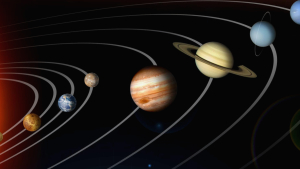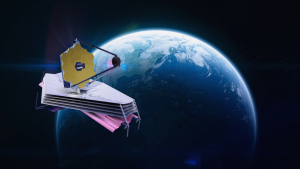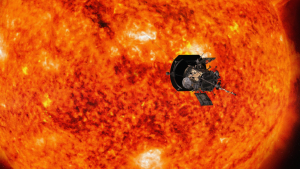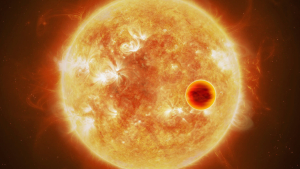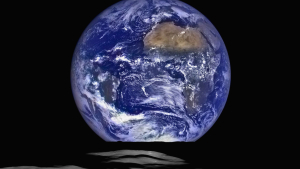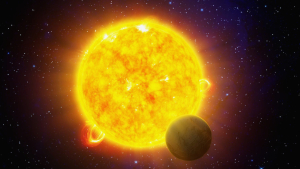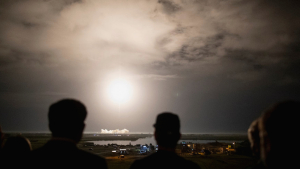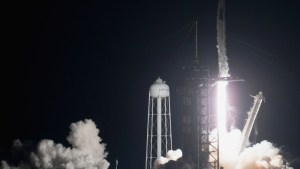More and more people are traveling into Earth orbit. In addition to the International Space Station, there is a new space station from China, and there is also a growing range of tourist flights into space. Europe also wants to continue to be represented in space. After more than twelve years, the European Space Agency (ESA) advertised positions for astronauts for the first time in spring 2021. The response was historically high.
In this conversion phase of the European Astronaut Corps, ESA General Director Josef Aschbacher is already discussing the next but one: At the European Space Conference in January 2022, he presented the future question to the assembled representatives from politics and space industry in Brussels. Where should Europe's astronauts start in the future? How international does the collaboration become? And why is space travel? In an interview, Aschbacher and the German astronaut Alexander Gerst provide answers.
»Riffreporter.de«: Mr. Gerst, you returned from your second mission Horizons on the ISS in December 2018. What are you doing at the moment?

Gerst: At the moment we are partners at eye level. We have cooperated very successfully with our international partners on the ISS in the past two decades. We have made a lot of contributions to this, such as the ATV room transporter, the European Columbus laboratory and the new module for the Lunar Gateway in the future. We were able to compensate for the great weakness that we cannot send people into space because we have not further developed our own carrier systems.

So far, Europe has paid for flights with NASA or Russia with specially developed hardware with which the ISS has been equipped, agreed on so-called barter contracts. Has this model of organising human space travel in Europe been bad?
Gerst: It has been a very good strategy for the past 20 years. You just have to say it: As a European at the space station, we have gone away very, very, very well with our participation of 8.2 percent of the American part of the space station. This is a small part, and we were still able to skim a lot of visibility for space travel and also a lot of scientific results.
At ESA, we are concerned that, unfortunately, this strategy will not continue in a straight line. As the international space landscape changes, we need to adapt the strategy. We can't avoid that. We now have to make this decision whether we want to fall behind or whether we want to stay at the front. If we do nothing, we will be taking this decision to the detriment of Europe. That is precisely the new situation to which we must adapt.
Aschbacher: In my opinion, the barter contracts were a very good deal for Europe because we keep the technology development with us, promote industry in Europe and get astronaut flights in return. But if a commercial US company now builds a space station, then the station will prefer to build completely in America. Participation in the form of hardware from Europe is no longer desirable.
What are the options?
Aschbacher: It goes from zero to the maximum option and everything in between. I want to conduct this discussion with the decision -makers next year, of course in the hope that this will lead to a process that will then go in a certain direction. Today, however, I can't tell you what this decision will be, but I hope that we will soon get the order to collect the facts and put the options on the table.
The zero option would be to abandon human spaceflight from Europe altogether. There are also arguments for this: space travel already has many important tasks to fulfil in our time, monitoring climate change with satellites or establishing secure Internet connections, as the European Commission is currently planning with its own megaconstellation and in the development of which ESA funds are also likely to flow. Shouldn't we say: Other things are more important than the flight of astronauts?
Aschbacher: It is true, it is a question of priorities. Of course, straw observation, navigation or telecommunications are very needed, and you can't really question them. We absolutely need them. The other question is, of course, how far your own starting opportunity in Europe would really change the budget. Because it will certainly not be the case that this is only financed from public funds. You would have to consult very strong commercial partners.
A European space flight without astronauts would mean that you would be one of the last of its kind, Mr Gerst. Unimaginable?
Gerst: You have to see space travel as a total package. We can test on the ISS sensors before we install them on expensive complex satellites. For example, during my last missions, we installed the Desis sensor for the earth observation on the ISS. In this way you can test it much cheaper and also modify it before it is later used on a satellite.
You can't just cut off the spearhead of space travel and hope that the rest of it will evolve. This may go well for a while, but it won't go well in the long run. At the moment we belong to a club of ambitious nations that pursues human exploration. If we want to continue to sit at the table, then we must act on an equal footing and continue to earn respect by bringing our own developments into this cooperation. We saw that again recently at NASA. In Europe, we have developed the service module for the Orion spacecraft that will fly humans to the Lunar Gateway. We wouldn't have been able to do that if we hadn't earned this respect for years in human spaceflight.
And since we talk about investments: It has been shown by independent auditors that every euro that we invest in the astronautical space travel flows back to society. So one would have to ask: Can we afford not to invest in astronautical space?
But what is human spaceflight good for? You will certainly have to explain this very precisely to society and politics in the coming months.
Gerst: Many scientific disciplines have different gaps that cannot be filled on earth. You need laboratories in weightlessness. It is about new materials, understanding of plant growth, our immune system or quantum physics. If we do not close these gaps, then science does not continue on earth.
In addition, there is the international cooperation, which results from working with partners on other continents and can bridge some ideological abyss. My first flight was in 2014 during the first Ukraine crisis. We were still able to work well together in the earth orbit. This makes space travel an anchor. It may prevent connections from really separating and then worse on earth.
The last and most important reason is inspiration. I experience this every day when I work with school classes. I see it in the big eyes of girls and boys when I say, "I flew into space, you've been able to do that for a long time." As a result, they recognize completely new possibilities and may be inspired, as I was then, to become a scientist or engineer, pilot or physician and then eventually even an astronaut. We depend on inspiring the young generation so that they can continue their education and have a goal.
How realistic is it that the ESA member states decide to develop their own spaceship for astronautic flights?
Aschbacher: We are Europe's space agency and already coordinate technological cooperation between individual countries. To discuss the options, we scheduled a Space Summit in Toulouse in mid-February.
A staggered meeting of the representatives relevant to space travel in the EU Commission and the Council of Ministers of the ESA.
Aschbacher: Exactly. There will certainly be important political signals from there. I hope that we will then perhaps have a year to think about the various partners. All countries are important in this process, and I will discuss with each country individually. What are the ideas? What are the expectations? What are the limitations? And then we have to develop a concept that really suits everyone and then bring that to the proposal.
One should not forget that space is a big project. We clearly saw this in the Apollo program and the moon landing in the 1960s. The United States would not be there today where they were without landing. I also expect an enormous influence on the politics of Europe. Even if Europe decides not to participate, this will have an impact on the continent. And we have to weigh all of this. Therefore, I also want to use experts who have nothing to do with space, but deal with history or economy in order to really illuminate the topic from all sides.
The interview was conducted during two one-on-one interviews at the European Space Conference in Brussels and was edited for better readability.
© Riffreporter The text is originally on "riffreporter de " under the title Why does Europe need its own spaceship? has been published and has been adapted and supplemented for.










